
Karl Haniel (born 12 February 1877 in Koblenz; died 30 October 1944 in Dabringhausen) was a German civil servant and entrepreneur.

Karl Haniel (born 12 February 1877 in Koblenz; died 30 October 1944 in Dabringhausen) was a German civil servant and entrepreneur.
Karl Haniel was the son of District Administrators Paul Haniel and Ida Nobiling. [1] He studied law in Bonn, where he became a member of the Corps Guestphalia Bonn, [2] and entered the Prussian judicial service in 1901 as a court trainee. A year later he received a doctorate.
From 1903 he worked as a government trainee in Düsseldorf. In 1907 he was appointed government assessor. In 1909 Haniel was employed in the Interior's Reich Office. Between 1912 and 1915, Haniel served as district administrator of the Merzig district in the then Prussian part of what was later to become Saarland.
From 1915 to 1917, Haniel worked in the civil administration of Hainaut (in occupied Belgium). In 1917 he became head of administration for the province of Wallonia. [3] [4]
Since 1920 Haniel became company leader of German company Franz Haniel & Cie.

Gustav Alfred Julius Meyer was a Nazi Party official and politician. He joined the Nazi Party in 1928 and was the Gauleiter of North Westphalia from 1931 to 1945, the Oberpräsident of the Province of Westphalia from 1938 to 1945 and the Reichsstatthalter of Lippe and Schaumburg-Lippe from 1933 to 1945.

The capital of Germany is the city state of Berlin. It is the seat of the President of Germany, whose official residence is Schloss Bellevue. The Bundesrat is the representation of the Federal States (Bundesländer) of Germany and has its seat at the former Prussian Herrenhaus. Though most of the ministries are seated in Berlin, some of them, as well as some minor departments, are seated in Bonn, the former capital of West Germany. Although Berlin is officially the capital of the Federal Republic of Germany, 8,000 out of the 18,000 total officials employed at the federal bureaucracy still work in Bonn, about 600 km (370 mi) away from Berlin.
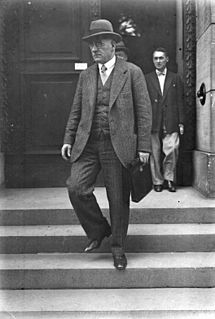
Otto Braun was a German Social Democratic politician who served as Prime Minister of Prussia for most of the time from 1920 to 1932. After the Nazis seized power in 1933, Braun went into exile in Switzerland.

Georg Friedrich Karl Freiherr von Hertling, from 1914 Count von Hertling, was a German politician of the Catholic Centre Party. He was foreign minister and minister president of Bavaria, then chancellor of the German Reich and minister president of Prussia from 1 November 1917 to 30 September 1918. He was the first party politician to hold the two offices; all the others were non-partisan.

Wilhelm Marx was a German lawyer, Catholic politician and a member of the Centre Party. He was the chancellor of Germany twice, from 1923 to 1925 and again from 1926 to 1928, and he also served briefly as the minister-president of Prussia in 1925, during the Weimar Republic. With a total of 3 years, 73 days, he was the longest consecutively serving Chancellor during the Weimar Republic.

Arthur Karl Greiser was a Nazi German politician, SS-Obergruppenführer, Gauleiter and Reichsstatthalter of the German-occupied territory of Wartheland. He was one of the persons primarily responsible for organizing the Holocaust in occupied Poland and numerous other crimes against humanity. He was arrested by the Americans in 1945, and was tried, convicted and executed by hanging in Poland in 1946.
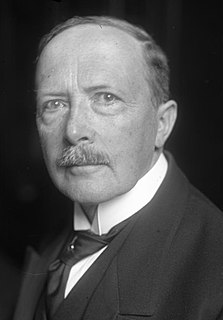
Walter Simons was a German lawyer and politician. He was Foreign Minister of the Weimar Republic in 1920-21 and served as president of the Reichsgericht from 1922 to 1929.

Ober Ost, short for Oberbefehlshaber der gesamten Deutschen Streitkräfte im Osten, was both a high-ranking position in the armed forces of the German Empire as well as the name given to the occupied territories on the German section of the Eastern Front of World War I, with the exception of Poland. It encompassed the former Russian governorates of Courland, Grodno, Vilna, Kovno and Suwałki. It was governed in succession by Paul von Hindenburg and Prince Leopold of Bavaria, and collapsed during the end of World War I.
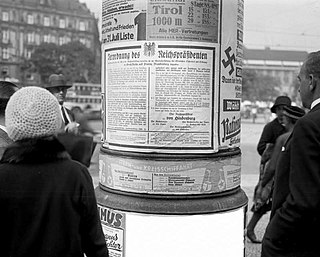
The 1932 Prussian coup d'état or Preußenschlag took place on July 20, 1932, when Reich President Paul von Hindenburg, at the request of Franz von Papen, then Reich Chancellor of Germany, invoked Article 48 of the Weimar Constitution to replace the legal government of the Free State of Prussia by von Papen as Reich Commissioner. A second decree the same day transferred executive power in Prussia to the Reich Minister of the Armed Forces Kurt von Schleicher and restricted fundamental rights.
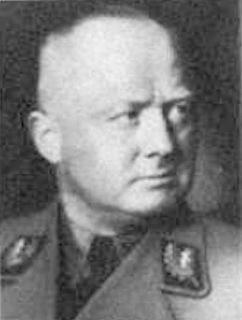
Jakob Sprenger was a Nazi Party official and politician who was the Party's Gauleiter of Hesse-Nassau South from 1927 to 1933 and Gau Hesse-Nassau from 1933 to 1945. He was also the Reichsstatthalter and Minister-President of the People's State of Hesse, the Oberpräsident of the Prussian Province of Nassau and an SA-Obergruppenführer.

The Federal Ministry of Defence, abbreviated BMVg, is a top-level federal agency, headed by the Federal Minister of Defence as a member of the Cabinet of Germany. The ministry is headquartered at the Hardthöhe district in Bonn and has a second office in the Bendlerblock building in Berlin.

The Free State of Prussia was a state of Germany from 1918 to 1947. It was established in 1918 following the German Revolution, abolishing the German Empire and founding the Weimar Republic in the aftermath of the First World War. The new state was a direct successor to the Kingdom of Prussia, but featured a democratic, republican government and smaller area based on territorial changes after the war. Despite bearing the brunt of Germany's territorial losses in Europe, Prussia remained the dominant state of Germany, comprising almost 5⁄8 (62.5%) of the country's territory and population, and home to the federal capital, Berlin. Prussia changed from the authoritarian state it had been under previous rulers to a democratic bastion within the Weimar Republic where democratic parties combined to win comfortable majorities in every free and fair election held.

Karl Jarres was a politician of the German People's Party during the Weimar Republic. From 1923 to 1924/25, he was the minister of the Interior and vice-chancellor of Germany. Jarres was also the long-serving mayor of Duisburg from 1914 to 1933. After the Nazis deposed him, he started a career in industry.

Moritz August von Bethmann-Hollweg was a German jurist and Prussian politician.
Waldemar Kraft was a German politician. A member of the SS in Nazi Germany, he served as Managing Director of the Reich Association for Land Management in the Annexed Territories from 1940 to 1945, administering parts of occupied Poland. After the war, he became a West German politician, sitting in the Landtag of Schleswig-Holstein from 1950 to 1953 and serving as Minister of Finance. He entered the Bundestag in 1953 and served as Federal Minister for Special Affairs in the Cabinet of Chancellor Konrad Adenauer from 1953 to 1956. He retired from the Bundestag in 1961.
Edgar Haniel von Haimhausen was a German diplomat.

Carl Rudolf Walther vom Rath was a German lawyer, scientist, entrepreneur and politician. In 1890 he became a member of the supervisory board of the Farbwerke vorm. In 1902 he became the company's chairman, and in 1926, he became the first deputy chairman of the IG Farben supervisory board. From 1894 to 1898, he was a member of the Prussian House of Representatives. From 1909 to 1918, he was a member of the Herrenhaus.
Felix Busch, formerly Felix Emil Johannes Friedländer was a German administrative lawyer whose family was persecuted by the Nazis because of their Jewish heritage.
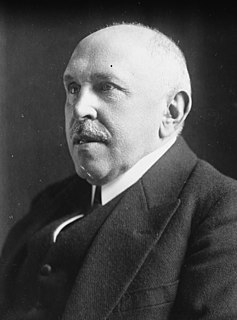
Ludwig Theodor Ferdinand Max Wallraf was a German politician who served as mayor of Cologne from 1907 to 1917. He was State Minister of the Interior from 1917 to 1918. As a German National People's Party politician, he was a member of the Reichstag from 1924 to 1930 and briefly served as its President in 1924/25.